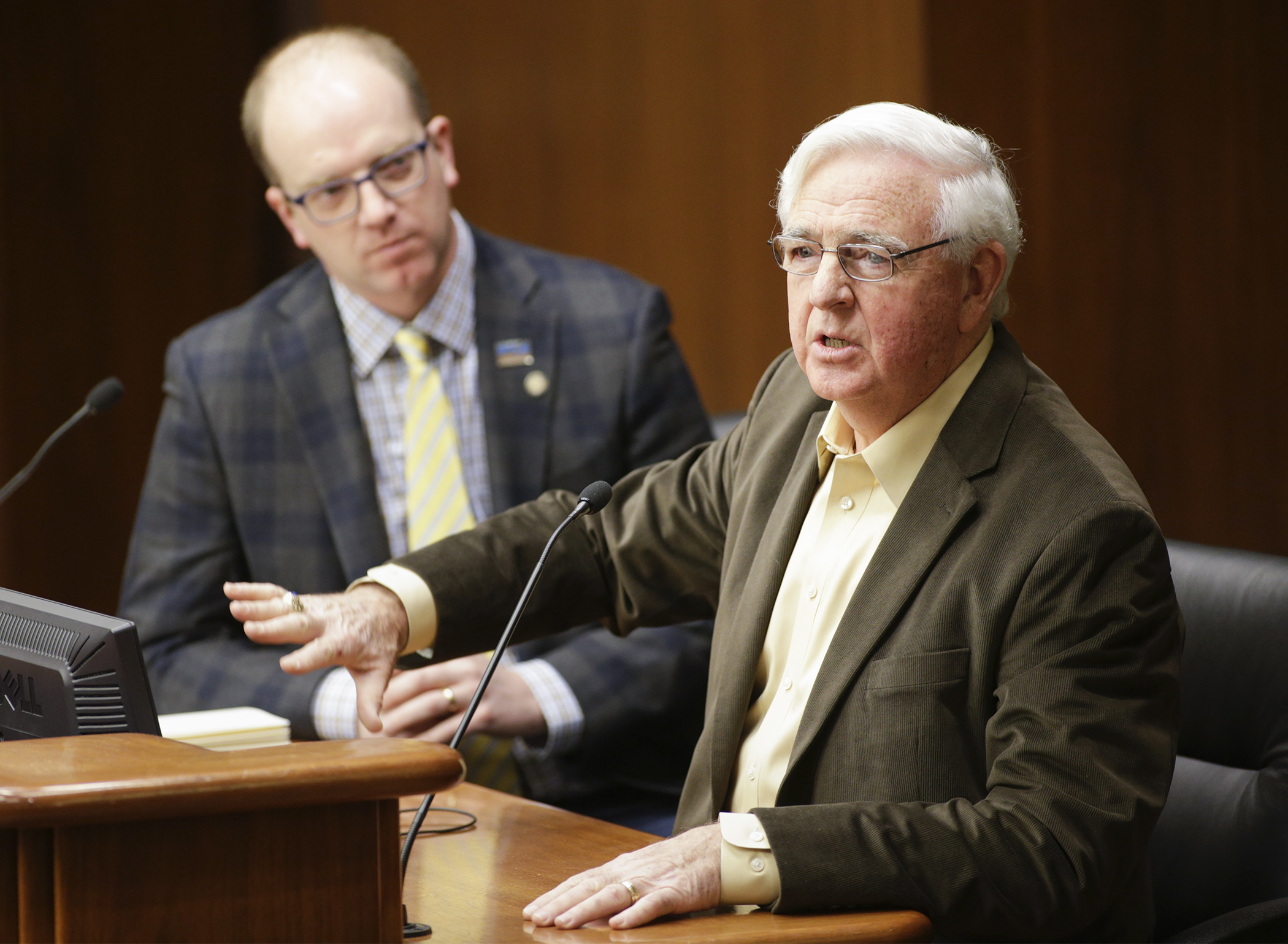Could donors aid state's efforts to tackle lack of affordable housing?
The consensus is that Minnesota has reached a crisis stage in affordable housing, officials say.
A study by the Minnesota Housing Partnership has concluded that the cost burden for renters has risen precipitously since the turn of the century. Among the state’s most in-demand jobs, six of the top 10 don’t pay enough to keep a worker in a one-bedroom apartment. It’s rippled outward to affect where companies set down stakes or expand, whether people choose to start a family, or if they have a place to sleep tonight.
But a bill that the House Taxes Committee laid over Wednesday for possible omnibus bill inclusion is designed to address the difficulty so many confront in finding affordable housing.
 Dennis Moriarty testifies in the House Taxes Committee on HF1156, sponsored by Rep. Brad Tabke, left, which would establish a fund to provide loans or grants for low-and moderate-income housing construction. Photo by Paul Battaglia
Dennis Moriarty testifies in the House Taxes Committee on HF1156, sponsored by Rep. Brad Tabke, left, which would establish a fund to provide loans or grants for low-and moderate-income housing construction. Photo by Paul BattagliaHF1156, sponsored by Rep. Brad Tabke (DFL-Shakopee), would establish a Minnesota Housing Finance Agency fund to which citizens could donate to help provide loans or grants for developers who create low- and moderate-income housing.
Donors would receive a nonrefundable tax credit for their full donation, which could range from $100 to $5 million per year. They could designate what housing project they wished to fund or place it in a larger pool earmarked for housing development. Total statewide credits would be limited to $25 million per year.
The proposed “Minnesota Tax Credit Contribution Fund for Affordable Housing” is designed after something similar North Dakota has had in place since 2011. It’s been used to create more than 2,500 new housing units in that state.
Under the bill, 35 percent of the fund would be expressly for single-family homes and 20 percent would be earmarked for cities with a population under 10,000.
Several speakers testified on the dire need for more affordable housing, and the bill has received the endorsement of such organizations as the Minneapolis Regional and St. Paul Area chambers of commerce, the League of Minnesota Cities and the Association of Minnesota Counties.
The Department of Revenue estimates that the tax credit would cost the General Fund about $25 million annually in Fiscal Year 2021 through Fiscal Year 2023.
Speaking in favor of the bill, Steve Borchardt, housing coalition director for the Rochester Area Foundation, said, “In Olmsted County right now, if you make $50,000 a year, you’re going to have difficulty finding a good place to rent. You’re going to have difficulty purchasing a house if you make $65,000 to $70,000 a year. … We are on the verge of telling an entire generation that they will not have the personal wealth-building tool of home ownership available to them.”
The companion, SF404, sponsored by Sen. Carla Nelson (R-Rochester), awaits action by the Senate Taxes Committee.
Related Articles
Search Session Daily
Advanced Search OptionsPriority Dailies
Ways and Means Committee OKs proposed $512 million supplemental budget on party-line vote
By Mike Cook Meeting more needs or fiscal irresponsibility is one way to sum up the differences among the two parties on a supplemental spending package a year after a $72 billion state budg...
Meeting more needs or fiscal irresponsibility is one way to sum up the differences among the two parties on a supplemental spending package a year after a $72 billion state budg...
Minnesota’s projected budget surplus balloons to $3.7 billion, but fiscal pressure still looms
By Rob Hubbard Just as Minnesota has experienced a warmer winter than usual, so has the state’s budget outlook warmed over the past few months.
On Thursday, Minnesota Management and Budget...
Just as Minnesota has experienced a warmer winter than usual, so has the state’s budget outlook warmed over the past few months.
On Thursday, Minnesota Management and Budget...